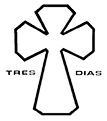That Bible At The Front Table
By Dr. Charles Allen
Before any talk is given on a Tres Dias weekend, we light a candle. There is always a Bible on that front table, for a very important reason. That book is at the center of everything that happens on a weekend. The words in the Bible have transformed millions and millions of lives, and they will transform lives during the weekend. How can we begin to describe this extraordinary book? If someone totally unfamiliar with the Bible were handed a copy and asked to jot down some impressions, he might note that it’s a big book, made up of 66 smaller books divided into two major sections, and that there are different kinds of literature: biography, poetry, hymns, history, short stories, proverbs, philosophy, law codes and informal letters. If he were to dig deeper, he might come up with a few other facts: Forty men wrote The Bible over approximately 1,600 years; the first part was written in Hebrew with a little in Aramaic, and the second part in Greek. Such information does not begin to answer the question, “What is the Bible and how does it transform lives?” If our hypothetical reader were to go further, he might say that the Old Testament focuses on Jewish history and is the record of man’s search for God. Nothing could be further from the truth. The greatest truth is this, that the Bible is the record of God’s search for man. Throughout the Bible, people are bent on trying to escape from God. In spite of this, God continues to seek after those same people, refusing to give up, continuing the pursuit in spite of countless rebuffs and evasions. God relentlessly chases man through chapter after chapter. This relentless pursuit dominates the story of the Jewish people throughout the Old Testament. The search culminates in the New Testament, where the claim is made that God so desired fellowship with man, that He sent not just emissaries, ambassadors, prophets or representatives, but in Jesus Christ, He came Himself. It is the most astounding truth that has ever been written. It is the most stupendous claim that has ever been made. God not only sought after people in the past, but the Bible is also a means by which He seeks us out today. We cannot read it without a sense of being involved, because the experiences of the people we read about in the Bible are basically our experiences. The questions they ask are timeless: “If a man dies, shall he live again?” (Job 14:14) “What do you think of the Christ?” (Matt. 22:42) “Who are you, Lord?” (Acts 9:5) “What shall I do Lord?” (Acts 22:10) “Why does the way of the wicked prosper?” (Jer. 12: 1) “Why are you cast down, O my soul?” (Ps. 42:5) We ask the same questions, even though we use different words: What happens when I die? Is this Jesus really more than a great man? Who is God? What difference does believing in God make? What’s the point of “being good”? Why does life sometimes seem futile? To find honest answers to those questions, we must go to the Bible. The answers emerge from the rough and tumble of life, and it is there we discover how right the Bible’s answers are. Not only do we find answers to our questions, we find proof that God is pursuing us. Not only do we know God’s demands and promises, but also God Himself “comes alive” and speaks to us. It is for this reason that Christians speak of the Bible as “the Word of God.” God speaks to people through the Bible, right where people are. The supreme revelation of His “Word,” His creative power, is the “event” of Jesus Christ, in His life, death and resurrection; “The Word made flesh.” The Bible is a special delivery letter with your name and address on it. It is more than a record; it is a call, an invitation, and urgent message to all of us. The message tells how to live with peace and joy in your life on earth, and in life to come.Dr. Charles Allen is a Member of Trinity Valley (TX) Tres Dias and serves as spiritual director to the policy committee of the Tres Dias International Secretariat.
Previous Story
The Power of Three
Next Story
